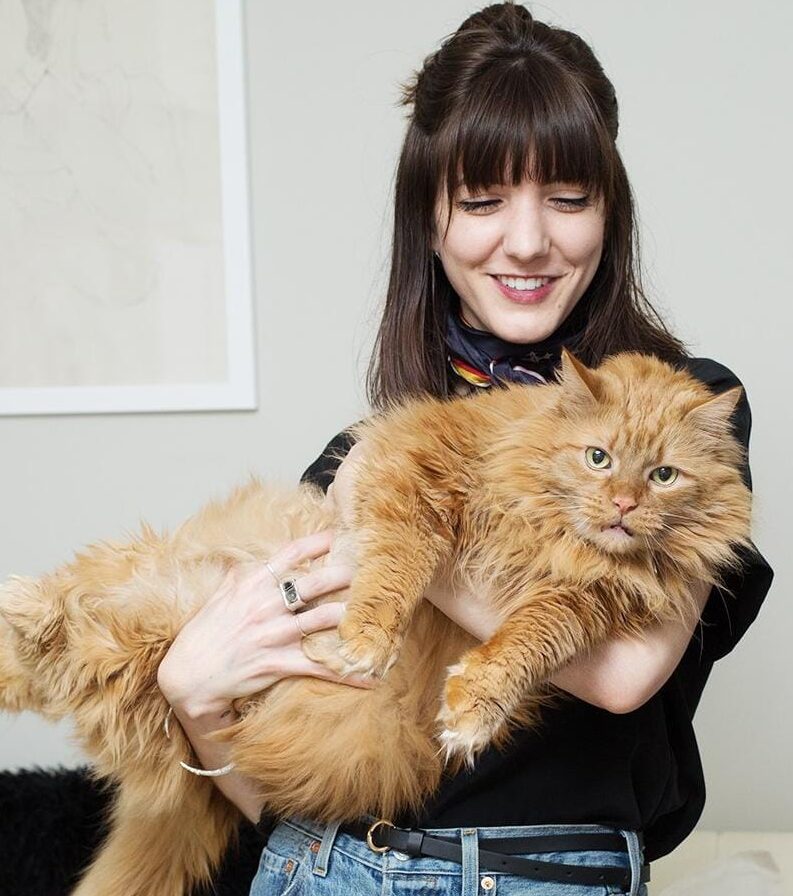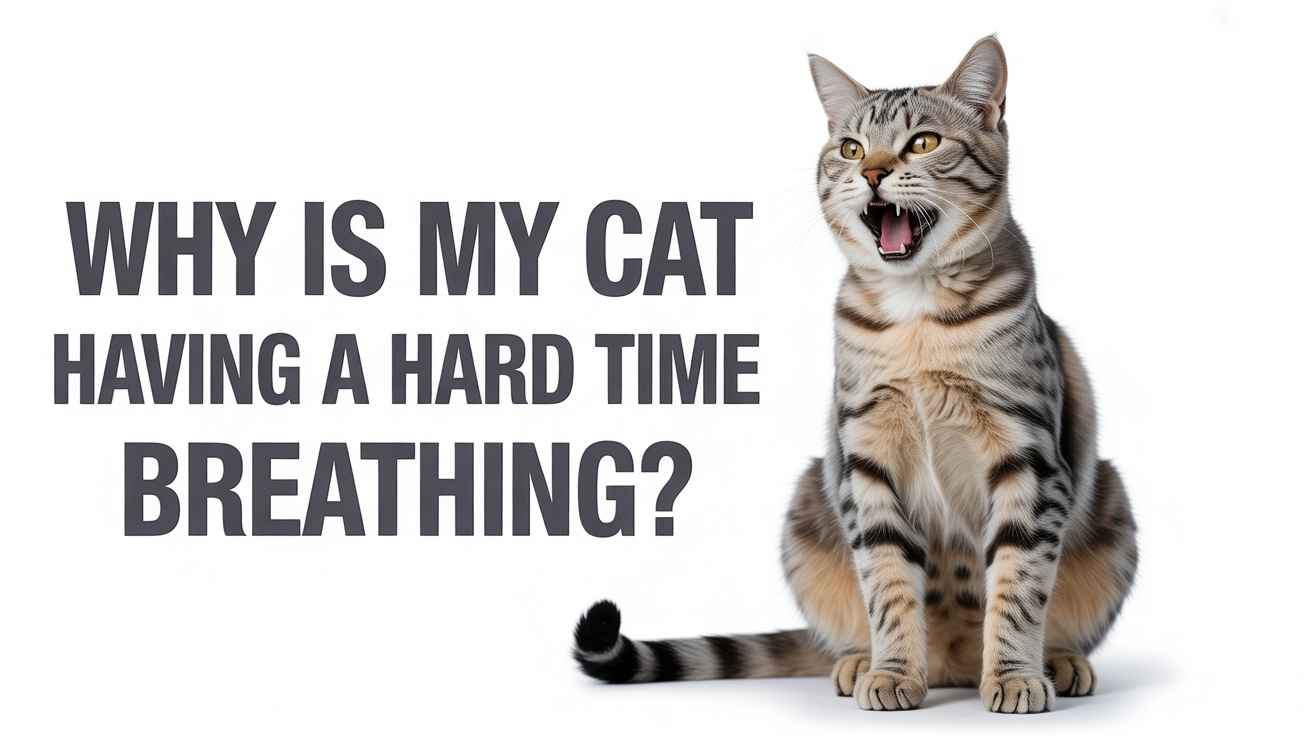Why Is My Cat Having a Hard Time Breathing? 5 leading causes include feline asthma, bronchitis, heart problems, infections, and airway blockages.
Why Is My Cat Having a Hard Time Breathing?
Many pet parents panic when they suddenly ask themselves, “Why is my cat having a hard time breathing?” The truth is, any change in your cat’s breathing pattern—whether rapid breathing, open-mouth panting, or noisy wheezing—can be a sign of something serious.
Cats are masters at hiding illness, so by the time you notice laboured breathing, your pet could already be in distress. Breathing problems in cats (known as dyspnea) may stem from asthma, heart disease, or infections, but they always require quick attention. Understanding the causes and warning signs could make all the difference for your cat’s health.
5 Reasons Why My Cat Is Having a Hard Time Breathing
| Reason | What It Means | Signs to Watch | Urgency |
|---|---|---|---|
| Asthma | Airways swell and tighten | Wheezing, coughing, panting | Fluid builds up in the lungs/chest |
| Infection | Fluid builds up in the lungs/chest | Sneezing, fever, fast breaths | Urgent care needed |
| Heart Disease | Fluid builds up in lungs/chest | Rapid rest breathing, weakness | Emergency |
| Fluid Buildup | Fluid around or in the lungs | Gasping, sitting upright | Emergency |
| Obstruction/Allergy | Blocked or swollen airway | Choking, sudden gasping | Emergency |
Normal vs. Abnormal Cat Breathing
- Healthy cats breathe 20–30 quiet breaths per minute while resting.
- Rapid breathing (tachypnea): More than 30 breaths per minute.
- Abnormal signs:
- Open-mouth breathing
- Noisy wheezing or whistling sounds
- Heavy chest and belly movement
- Cats should not breathe audibly at rest.
- Laboured breathing may signal lung or airway problems.
- Spotting changes early allows for quick action before they become life-threatening.
Warning Signs of Breathing Problems in Cats
If you’re asking, “Why is my cat having a hard time breathing?”, watch for clear warning signs. Common red flags include wheezing in cats, coughing, or noisy, raspy breaths.
Some cats sit with their neck stretched forward or elbows spread to ease respiratory distress. Others may hide, seem restless, or gasp for air. Pale or bluish gums mean oxygen levels are dangerously low.
These signs should never be ignored—cats deteriorate quickly, and what looks like minor laboured breathing can escalate into a medical emergency within hours.

Common Medical Causes of Cat Breathing Difficulties
- Feline asthma is a common cause of cat breathing problems.
- It narrows airways, making oxygen intake difficult.
- Key symptoms:
- Wheezing
- Coughing
- Open-mouth breathing after activity
- Feline bronchitis can cause similar breathing struggles.
- Triggers include allergens such as dust, smoke, or pollen.
- Asthma attacks can escalate quickly and become dangerous.
- Affected cats need immediate veterinary care for:
- Diagnosis
- Oxygen support
- Long-term treatment with inhalers is required if necessary.
Infections & Pneumonia
Another reason you may ask, “Why is my cat having a hard time breathing?” is a respiratory infection like pneumonia. These infections can cause sneezing, a stuffy nose, and watery eyes.
If the infection goes to the lungs, it blocks oxygen. Signs include coughing, tiredness, fever, and fast breathing. Because mucus and fluid make breathing hard, the problem can get worse quickly.
If your cat shows cold-like signs and laboured breathing, see a vet right away to prevent serious health issues.
Heart Disease & Fluid Buildup
Heart problems are another reason you may ask, “Why is my cat having a hard time breathing?” Heart failure can cause fluid in the lungs or chest, making it hard to breathe.
Signs include fast breathing, weakness, or even collapse. Some cats breathe quickly while resting, and owners may not notice until it gets worse.
Because fluid blocks oxygen, your cat needs urgent vet care. Treatment may include oxygen therapy, diuretics, and long-term care for the heart disease.

Pleural Effusion / Pulmonary Oedema
Sometimes the reason you ask, “Why is my cat having a hard time breathing?” is that there is fluid around the lungs. Pleural effusion refers to fluid accumulating in the chest, whereas pulmonary oedema involves fluid accumulating within the lungs.
Both make the lungs work harder, causing fast breathing, gasping, or open-mouth breathing. Cats may sit upright with their neck stretched to get more air.
Because fluid buildup is hazardous, your cat needs immediate vet care to drain the chest and help with breathing.
Anemia & Tumors
Sometimes the answer to “Why is my cat having a hard time breathing?” is hidden problems like anaemia or tumours. With anaemia, the body has too few red blood cells, so less oxygen is carried.
This makes cats weak, pale, and breathe fast. Tumours in the lungs or chest can block air, causing wheezing or laboured breathing.
These problems often grow slowly, so owners may not notice until it’s serious. A vet check with blood tests and scans is needed for early detection.
Other Possible Reasons for Breathing Trouble
Not every case of “Why is my cat having a hard time breathing?” is caused by disease. Sometimes a foreign object can block the airway, leading to choking or gasping.
Trauma, shock, or heatstroke can also cause sudden breathing trouble. In some cats, severe allergies may swell the airways, especially in flat-faced breeds.
Because these problems can worsen very quickly, any cat with sudden breathing trouble needs an emergency vet visit right away.

When to Seek Emergency Care
- If you’re asking, “Why is my cat having a hard time breathing?” treat it as an emergency.
- Cats should not wait until a regular vet appointment.
- Emergency warning signs:
- Open-mouth breathing
- Blue or pale gums
- Labored breathing
- Collapsing or weakness
- More than 40 breaths per minute at rest
- These signs mean dangerously low oxygen levels that can be fatal.
- Safest step: transport your cat calmly to a veterinary hospital for oxygen and urgent care.
Vet Diagnosis & Treatment Options
When you ask, “Why is my cat having a hard time breathing?”, a vet is very important. The vet may do a check-up, take X-rays or an ultrasound, and run blood tests to find the cause.
Treatments can be different: oxygen therapy helps cats breathe, medicines like bronchodilators or steroids treat asthma, diuretics reduce fluid from heart problems, and antibiotics fight infections.
If there is fluid around the lungs (pleural effusion), the vet may drain it to help breathing. Each problem needs different care, so a quick diagnosis gives your cat the best chance.
At-Home Care & Prevention

If your cat is having trouble breathing, a vet is most important. At home, you can help by keeping the space calm and clean.
Avoid smoke, dust, and strong smells. Watch your cat’s breathing when resting so you notice changes early. Provide vaccines, parasite control, and healthy food to reduce health risks. Remember, home care helps but does not replace a vet—fast vet care can save your cat’s life.
FAQs
Q1: Why is my cat having a hard time breathing while resting?
This may signal asthma, heart disease, or fluid buildup. Any resting breathing trouble requires urgent veterinary care.
Q2: Why is my cat breathing fast at night?
Rapid breathing may stem from stress, infection, or hidden heart issues. Tracking patterns helps your vet.
Q3: What should I do if my cat is gasping for air?
Go to the vet immediately—gasping is an emergency.
Q4: Can allergies cause my cat’s breathing problems?
Yes, severe allergies may swell airways, especially in flat-faced breeds.

Hi, I’m Sana Sajid!I’m the voice behind CatsCare.blog, sharing my 10+ years of hands-on cat care experience. With a diploma in animal care, I offer practical tips, trusted advice, and easy-to-follow guides to help keep your cats healthy and happy.
When I’m not writing, I spend time with my own cats or exploring the latest developments in feline health. Follow CatsCare.blog for expert insights and real cat stories!


![A mother orange and white tabby cat sitting with her four kittens (two gray, two orange) in front of a wooden shelf, related to information on when or why a [Cat move her Kittens].](https://catscare.blog/wp-content/uploads/2025/12/Cat-move-her-Kittens.jpg)
![A close-up photograph of a fluffy domestic longhair cat with gray and white tabby markings, looking up intensely at a human finger that is lightly touching a strand of twinkling fairy lights. The cat has long, prominent whiskers and a thick coat. [Why Are My Cats So Staticy]](https://catscare.blog/wp-content/uploads/2025/11/Why-Are-My-Cats-So-Staticy-.jpg)


8 thoughts on “Why Is My Cat Having a Hard Time Breathing? Top 5 Reasons”